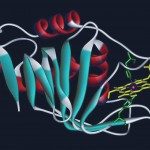Link to Pubmed [PMID] – 15982915
Comp. Biochem. Physiol. B, Biochem. Mol. Biol. 2005 Aug;141(4):498-504
The redox titration of extracellular hemoglobin of Glossoscolex paulistus (Annelidea) was investigated in different pH conditions and after dissociation induced by pressure. Oxidation increased with increasing pH, as shown by the reduced amount of ferricyanide necessary for the oxidation of hemoglobin. This behavior was the opposite of that of vertebrate hemoglobins. The potential of half oxidation (E1/2) changed from -65.3 to +146.8 mV when the pH increased from 4.50 to 8.75. The functional properties indicated a reduction in the log P50 from 1.28 to 0.28 in this pH range. The dissociation at alkaline pH or induced by high pressure, confirmed by HPLC gel filtration, suggested that disassembly of the hemoglobin could be involved in the increased potential for oxidation. These results suggest that the high stability and prolonged lifetime common to invertebrate hemoglobins is related to their low tendency to oxidize at acidic pH, in contrast to vertebrate hemoglobins.

